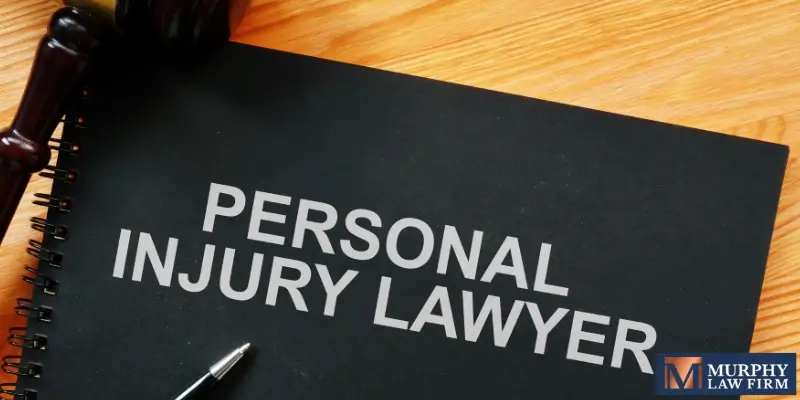A personal injury case is a legal dispute that arises when an individual is harmed due to another person or party’s misconduct or negligence. Common examples include car accidents, slips and falls, workplace accidents, and medical malpractice. The main aspect of a personal injury case is that someone else’s actions caused an injury. If this link can be established, it may be possible to file a personal injury claim to receive compensation.
Denham Springs Personal Injury Lawyer
Denham Springs Personal Injury Attorney
When someone else’s negligence causes your injury, they need to be held accountable. Our lawyers team at Murphy Law Firm understands that the medical bills, lost wages, and pain and suffering you deal with aren’t just insignificant numbers; each one affects you. A skilled Denham Springs personal injury lawyer can understands how much a personal injury claim can impact your life and won’t stop fighting until you receive the compensation you’re entitled to. Contact us today to get the legal advice.

Making a Difference in South Louisiana
If you’ve been wronged due to the negligent actions of others, Murphy Law Firm can help make things right. Our team of personal injury attorneys is ready to fight for you. We take a thorough and meticulous approach to each case to ensure a positive outcome. We are based in Baton Rouge and serve clients in Denham Springs and throughout south Louisiana, offering the support you need to pursue the appropriate amount of compensation.
Common Types of Personal Injury Claims
Personal injury claims can be filed for a variety of injuries or accidents, but there are some cases that are more commonly seen, including:
- Motor Vehicle Accidents: Car accidents are one of the most common types of personal injury cases. Whether it’s a two-car collision or a pedestrian being struck by a car, injuries can range from minor cuts and bruises to life-threatening injuries. Victims can usually seek compensation for the medical bills and lost wages associated with the accident.
- Slip and Falls: Property owners are responsible for maintaining safe properties. If someone slips or trips and falls because of a hazard in a building or on a property that was not properly taken care of, they could have a personal injury claim based on premises liability.
- Medical Malpractice: If a healthcare provider’s negligence causes injury or death, it can lead to a medical malpractice claim. Examples of medical malpractice include surgical errors, misdiagnoses, or improper treatment plans or medications. These cases often require additional testimony to establish that the healthcare provider did not meet the standard of care that was expected of them.
- Workplace Accidents: Injuries sustained on the job can lead to workers’ compensation claims, especially in the construction industry and industries involving straining work. These are not personal injury claims, but if a third party is involved, you might also have a claim outside of the workers’ compensation system.
- Product Liability: Defective or dangerous products can cause significant harm to consumers. These cases hold manufacturers, designers, and distributors accountable when their products are unsafe. Common examples include defective auto parts, medical devices, and ineffective protective equipment.
While it’s possible to file a claim on your own, you are more likely to succeed in your pursuit with the help of a rideshare accident lawyer if your case involves a rideshare vehicle. Their expertise can help ensure you receive the compensation you deserve. An experienced lawyer can navigate the complexities of the legal process, gather necessary evidence, and ensure that the dog owner is held accountable for the damages. With their expertise, you can increase your chances of securing the compensation you deserve for medical bills, pain and suffering, and other related damages.
Negligence in Personal Injury Law
Negligence is the foundation of most personal injury claims. In order for negligence to be proven, the injured party must show that the defendant owed them a duty of care, breached that duty, and caused harm as a result. For example, a driver has a duty to drive safely when on the road with other drivers. If they violate traffic laws and cause an accident, they could be found liable.
One of the most important elements in a personal injury case is causation. This is when you prove that the defendant’s breach of duty directly resulted in your injury. For example, in a motorcycle accident, if a driver runs a red light and strikes a motorcyclist, the motorist’s breach of duty (failing to stop) directly causes the injury to the motorcyclist. If you establish causation, you may be able to recover damages. Proving this link between the defendant’s actions and your injury is key to holding them accountable and securing the compensation you deserve.
Proving negligence can vary in complexity depending on the case. For instance, in medical malpractice cases, establishing negligence requires proving that a medical professional failed to provide the standard of care that another professional in their field would have. This is usually proved with the testimony of another professional asserting that the defendant breached their duty of care.
Denham Springs Personal Injury Lawyer
Who Is Liable in a Personal Injury Case?
Determining liability is an important aspect of any personal injury case. In some situations, liability can be more straightforward, such as when a driver runs a red light and causes an accident. In other cases, it may be more complex, involving multiple parties or the plaintiff having some fault.
In Louisiana, if the injured party is found partially responsible for their injury, their compensation could be reduced by the percentage of fault assigned to them. Liability could also extend beyond the direct cause of the injury. If a defective product causes harm, then the manufacturers, designers, or even distributors could be held responsible.
Filing a Personal Injury Claim
A personal injury claim starts with a consultation with an attorney. They can assess the details of your case to make sure you have a valid claim. Once the claim is initiated, the attorney can gather relevant evidence to build your case, such as medical records and other reports. This phase helps establish liability and allows your attorney to calculate the full extent of your damages.
After sufficient evidence is collected, an attorney can send a demand letter to the at-fault party or their insurance company that outlines your case and the compensation you are seeking. This is usually followed by a negotiation phase with both sides attempting to reach an agreement. If this process fails, the case may go to trial to be resolved through litigation.
Damages To Expect
Damages in personal injury cases are divided into two categories: economic and non-economic. Economic damages are usually calculated based on documented expenses and financial losses. These damages can include medical bills and other forms of tangible damage. Non-economic damages are more subjective and can include pain and suffering, emotional distress, and other personal experiences that are difficult to assign a number to.
It is also possible for the courts to assign punitive damages. These types of damages are made to punish the defendant and prevent similar future behavior. They are generally not included and are usually reserved for more extreme cases.
Should I Negotiate or Go to Trial?
The majority of personal injury cases are solved through settlement negotiations. This allows both parties to avoid the time and expense of a trial. During the negotiation phase, your attorney can work with the at-fault party’s insurance company to reach a fair agreement. Settlements provide the benefit of a quicker resolution and allow victims to receive compensation without the unpredictability of a trial.
If the insurance company offers an unfairly low settlement amount or disputes elements of the claim, an attorney might recommend taking the case to trial. While trials can take a long time and be expensive, they offer the opportunity for a jury to award full compensation based on the evidence provided. Whether or not you go to trial depends on the details of your case and if the settlement offers are appropriate based on your claim.
Why Do I Need a Personal Injury Lawyer?
A personal injury lawyer plays an important role in helping victims secure compensation. From the initial investigation to negotiations and potentially a court trial, an attorney can handle every legal aspect of the case. They know the legal landscape of personal injury cases and how to effectively prove negligence. You can avoid common mistakes like missing essential deadlines when you have a lawyer on your side.
Beyond the legal aspects, personal injury lawyers can provide much-needed emotional support. They understand the trauma and stress that come with injuries and legal battles and can offer compassion and reassurance throughout the process. They can help you confidently work through your case and give you assistance during tough times.
Insurance companies are for-profit companies that are interested in making money. They may use several tactics to reduce or deny personal injury claims. One common strategy is offering a low initial settlement in hopes that victims who are desperate for immediate financial relief will accept less than they deserve. They may delay processing your claim or dispute the severity of your injuries to extend the duration of the process and exhaust you.
Adjusters might also try to shift blame onto the victim or argue that a pre-existing condition caused their injury rather than the accident. Having an attorney who understands these strategies and knows how to approach them is crucial for the outcome of your case. They can use medical evidence to differentiate between your previous health status and the injuries directly caused by the accident.
How To Choose the Right Personal Injury Lawyer
Choosing the right attorney can significantly impact your personal injury case. One of the most important things to look for in a lawyer is sufficient experience with personal injury cases. These types of situations require certain knowledge of medical issues, insurance tactics, and legal precedents that may apply to your case. An attorney with a proven track record of success and positive reviews from clients can be effective legal counsel.
It’s also good to have a personal rapport with your attorney. This can be assessed during an initial consultation. Pay attention to how the attorney listens to your concerns and explains legal concepts to you. You need someone who is good at communicating, shows an interest in your case, and makes you feel comfortable.
Additionally, ask questions about a lawyer’s fee structure to be aware of your financial obligations before starting the process. Many attorneys work on a contingency fee basis, so they take a percentage of the compensation you’re awarded instead of charging an upfront fee. This can make them more accessible, especially when you’re dealing with the financial aftermath of a personal injury.
Maximizing Your Compensation
It’s important to understand how to secure the maximum amount of compensation from a personal injury claim. It involves documenting everything related to the accident and your injuries. Keep as many records as possible of medical treatments and any expenses related to your injuries. In Louisiana, documentation is crucial for building a strong case. Take photos of your injuries and the scene of the accident, if possible. These images can serve as powerful evidence to support your claim and help demonstrate the severity of your injuries and the circumstances of the incident.
Next, seek medical attention as soon as possible. Delays in medical treatment can be used against you by insurers, especially in Denham Springs where insurance companies may look for any reason to minimize your claim. Follow all medical advice given to you to demonstrate the seriousness of your injuries. Avoid discussing your case on social media so as not to undermine your case. What you post online can be used as evidence, potentially harming your chances of receiving fair compensation.
FAQs
How Do I Know if I Have a Valid Personal Injury Claim?
To determine if you have a valid personal injury claim, you have to assess whether another party’s actions or negligence caused your injury and damages. This means establishing that the other party had a duty of care to you that they breached. Their actions must have caused injuries that resulted in actual damages, such as medical expenses or pain and suffering. To further evaluate your claim, review it with an attorney who is experienced in personal injury law.
Do I Need a Lawyer to Handle My Personal Injury Claim?
It is a good idea to have a lawyer handle your personal injury claim. Hiring an attorney can significantly increase your chances of receiving fair compensation. Insurance companies often try to reduce payouts or deny claims altogether, and without legal representation, you may be given a settlement that is less than the actual value of your claim. A personal injury lawyer knows the complexities of the law and can handle negotiations on your behalf.
What Is the Role of Insurance Companies in a Personal Injury Case?
The role of insurance companies in a personal injury case is to represent the at-fault party and settle the case by compensating the victim. They often want to minimize the liability of the person who purchased their policy to avoid a large payout. This can lead to tactics aimed at lowering the compensation to which victims are entitled. In some cases, the victim’s insurance can also cover medical expenses.
Maximize Your Compensation With a Denham Springs Personal Injury Lawyer
Filing a personal injury claim can be a difficult process, but there is help available. Schedule a consultation with Murphy Law Firm today to work towards securing compensation and peace of mind. We’ve recovered millions of dollars for our clients, and we’ll fight just as hard for you. We won’t hesitate to take your case to trial if necessary.




